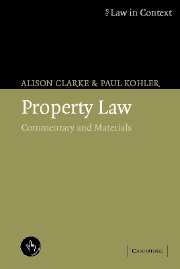Book contents
- Frontmatter
- Contents
- Preface
- Acknowledgments
- Table of cases
- Table of statutes
- Table of statutory instruments
- Table of treaties
- Table of EC legislation
- Part 1 The concept of property
- Part 2 The nature of proprietary interests
- Part 3 The acquisition and disposition of property interests
- 10 Title
- 11 Acquiring title by possession
- 12 Transfer and grant
- 13 Acquiring interests by other methods
- 14 Enforceability and priority of interests
- 15 Registration
- Part 4 Proprietary relationships
- Bibliography
- Index
15 - Registration
Published online by Cambridge University Press: 05 June 2012
- Frontmatter
- Contents
- Preface
- Acknowledgments
- Table of cases
- Table of statutes
- Table of statutory instruments
- Table of treaties
- Table of EC legislation
- Part 1 The concept of property
- Part 2 The nature of proprietary interests
- Part 3 The acquisition and disposition of property interests
- 10 Title
- 11 Acquiring title by possession
- 12 Transfer and grant
- 13 Acquiring interests by other methods
- 14 Enforceability and priority of interests
- 15 Registration
- Part 4 Proprietary relationships
- Bibliography
- Index
Summary
What are registration systems for?
In this chapter, as in the previous one, we are looking at registration primarily as a means of protecting private property rights. A property registration system can provide more effective ways of dealing with, or averting, the kind of difficulties over the enforceability and priority of property interests that we considered in the previous chapter, and can also facilitate proof of title, as we noted in Chapter 10. This not only makes the assets the subject of the registration system more freely marketable – assets are more easily traded if title can be proved quickly, cheaply and with certainty – but also helps promote security of title. Infringements of an interest holder's rights are easier to combat (and therefore less likely to occur) when the interest holder's title is beyond dispute.
However, it is important to appreciate that a state might decide to set up a property registration system for purposes other than the protection of private rights. One of our oldest property registers, the Shipping Registry, was set up by the Navigation Act 1660 primarily for the protection of British trade. British-owned ships were required to be registered in their local British port to enable the port authorities to ensure that foreign-owned ships did not trade from British ports, and that various privileges were accorded only to British-owned ships.
- Type
- Chapter
- Information
- Property LawCommentary and Materials, pp. 537 - 568Publisher: Cambridge University PressPrint publication year: 2005



